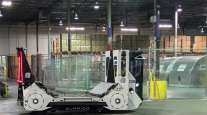Senior Reporter
Self-Driving Startups Work Through Health Crisis

[Ensure you have all the info you need in these unprecedented times. Subscribe now.]
Investor-funded startups competing hard to commercialize highly automated heavy-duty trucks found themselves having to deal with unfamiliar territory in late March given the uncertainties and disruptions from the spread of the novel coronavirus — just like the rest of the trucking industry.
Two companies, Ike and Kodiak Robotics, recently made the difficult choice to let some employees go.
Meanwhile, as the nation applauds the essential role trucking plays during a prolonged crisis, some company executives told Transport Topics they all see their technologies eventually expanding that vital role in new and better ways.

Much of the trucking industry relies on older onboard technology for critical functions, which can hurt reliability and efficiency. So is it time for fleets and their technology vendors to implement faster replacement cycles for onboard tech? Seth Clevenger talks to Ray Greer of Omnitracs and Deryk Powell of Velociti. Hear a snippet, above, and get the full program by going to RoadSigns.TTNews.com.
For the most part, these developers aim to enable what SAE International has defined as Level 4 automated driving, in which the truck can drive itself under certain conditions without any driver input or backup assistance.
A further shaking out in the segment is possible, one CEO said. In February, self-driving trucking firm Starsky Robotics shut down after failing to raise additional venture capital to support its remote-controlled, or teleoperated, approach.
The latest economic challenges are likely to pose another test and lead to consolidation in the self-driving truck space, “leaving the strongest companies to emerge in a better position to deliver a real product to the industry,” Ike co-founder and CEO Alden Woodrow said.
More importantly, he said, “this crisis has highlighted how critical trucking, and truck drivers, are to our economy and our way of life. We hope that appreciation continues as our nation emerges from the pandemic, including an increased understanding of how automation can directly benefit people, especially those putting themselves in harm’s way to keep our economy moving.”
The uncertainty caused by the COVID-19 crisis, however, forced Ike to let go of an unspecified number of “valued colleagues,” who are now being supporting with several months of severance and other support, according to a company statement.
RELATED: Analysts: Trucking Ripe With Opportunities for Autonomous Technology
The investment we’ve made in technologies like cloud infrastructure and simulation have allowed Ike to keep making rapid progress even while our prototype vehicles wait out California’s shelter-in-place rules,” Woodrow said. “As we highlighted in our safety report last fall, by design we don’t need to do brute force testing on public roads in order to develop our technology. This allows us to fulfill our responsibility to flatten the curve by having our entire team work remotely and help minimize the risk to essential workers.”
Kodiak Robotics reduced its headcount by 15 employees, responding to what it called COVID-19’s dramatic economic impact and uncertainty.
“While this is not a decision anyone ever wants to make, we’re confident this is the right way to position Kodiak for the future,” CEO Don Burnette said.

Burnette
He added that future includes technology that can increase the resilience of the nation’s freight networks while allowing more drivers to go home to their families at night.
“Kodiak remains committed to its vision of making self-driving trucks the first autonomous vehicles deployed on American roads at scale. We tip our hats to our drivers and to truckers everywhere, and are glad we are still able to do our small part by helping our customers move critical freight,” Burnette said.
At TuSimple, the company continues to meet its technical milestones, said spokesman Robert Brown, and is expanding its autonomous routes into Texas, and “developing new partnerships, hiring top talent and adding new customers.”
RELATED: TuSimple Expands Autonomous Trucking Program With UPS
The company has implemented a work-from-home policy at its San Diego headquarters, he said. At its Tucson, Ariz., terminal, anyone who can do their job from home is doing so, and the company is following guidelines from the Centers for Disease Control and Prevention and has increased its cleaning protocols.

Rodrigues
Alex Rodrigues, CEO of Embark Trucks, expects the company will be able to avoid some of the “hard choices” others in the industry have made.
“Embark has substantial cash reserves on hand as well as a bench of some of the strongest investors in Silicon Valley backing the company,” he said, adding there are “some cool things in the pipe.”
At Plus.ai, the focus is on virtual simulation testing while employees are working from home.
“Plus.ai is well-capitalized and continues to grow, with new team members having joined the last few weeks, and more planned in the coming weeks,” said Shawn Kerrigan, co-founder and chief operating officer. “We are seeing a higher number of candidates recently and invite talented engineers who’re looking to help build the future of autonomous trucks to apply.”
Want more news? Listen to today's daily briefing:




